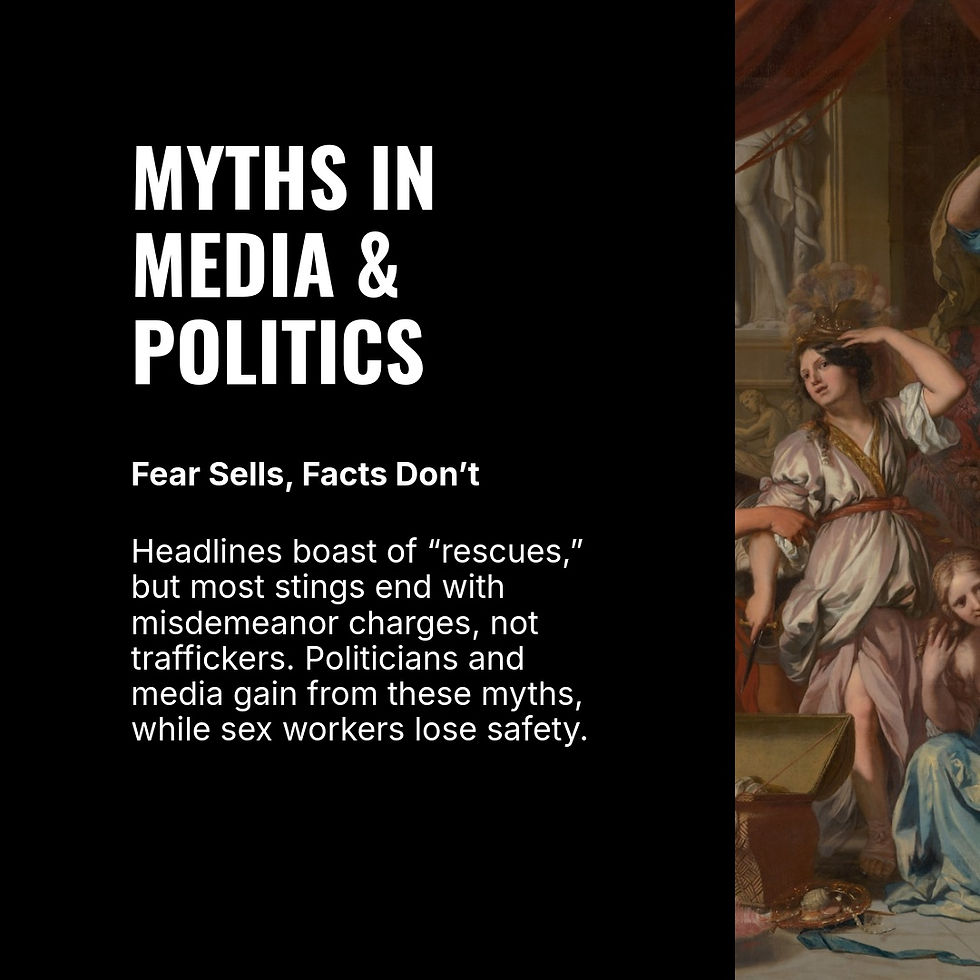From Taboo to Tool: How Myths About Sex Work Keep Power in Place
- Alex Andrews

- Oct 17, 2025
- 4 min read
Over the past few months in Receipts, Please, we’ve tackled ten of the most common myths about sex work - debunking them with data, lived experience, and truth.
But those ten are only the tip of the iceberg.
Myths about sex workers are everywhere, multiplying in the gaps left by silence, stigma, and fear. They persist because they serve powerful social functions: keeping women in line, upholding respectability politics, and justifying harmful laws.
Why so many? Because sex work disrupts the rules.

Sex + Money = Cultural Taboo
When sex is exchanged for money, it collides with two deeply entrenched cultural beliefs: that sex should be private, moralized, and tied to love, and that women’s labor should be undervalued or unpaid. Selling sex disrupts both of those norms at once, which invites judgment, sensationalism, and distortion.
Think about how quickly the public sympathizes with a waitress struggling to make ends meet but condemns a dancer who earns the same money in one night. Both women are working, but only one is seen as “respectable.” Or consider the hypocrisy of a man paying for dinner and gifts in hopes of sex - socially acceptable - while direct payment for sex is treated as criminal. The taboo isn’t about money or intimacy; it’s about who gets to control the terms.

Fear of Women’s Autonomy
Sex workers represent a threat to patriarchal order because they exercise control over their bodies, time, and income outside traditional approval systems. Myths spring from that fear. If women can choose sexual labor on their own terms, the old narratives of dependency and subservience begin to crumble.
One woman recently shared with us how her family dismissed her choices, insisting she must be “forced.” The idea that she could freely decide to support herself through sex work was too unsettling for them to accept. By insisting she was a victim, they preserved their worldview - even though it erased her agency. This is how myths work: they rewrite women’s autonomy into victimhood to make it palatable.

Stigma as Social Glue
Misconceptions about sex work serve as a kind of social glue, dividing “good women” from “bad women.” Respectability politics depends on these divisions, offering safety and legitimacy only to those who conform to narrow ideals. Stigma gives others a sense of moral superiority while pushing sex workers further to the margins.
We hear this every time someone says, “I support women, just not those women.” A domestic violence shelter once turned away a woman because of her criminal record for prostitution, even though she was fleeing an abusive partner. Stigma allowed the shelter to rationalize denying her safety, reinforcing the idea that only some women are “worthy” of protection.

Media and Political Incentives
Myths thrive because they sell. The media knows sensational stories about trafficking rings and “rescued victims” draw more attention than nuanced reporting on labor rights or housing insecurity. Politicians know that promising to “rescue victims” or “crack down on demand” is an easy way to score points with voters. Facts rarely make headlines; fear always does.
Take the endless “sex trafficking stings” announced by sheriffs’ offices. Headlines boast about “dozens rescued,” but read closer and you’ll find most were charged with misdemeanor prostitution. No traffickers. No victims rescued. Just people criminalized. The myth of the rescue raid is more politically useful than the truth.

Carceral Convenience
Criminalization relies on myths to justify itself. If the public believes sex work is inherently dangerous, exploitative, or criminal, then police crackdowns and surveillance look like protection. Myths give cover to harmful policies that funnel resources into policing rather than housing, healthcare, or community safety. By disguising punishment as “rescue,” myths make it easier to maintain systems of control without addressing root causes of inequality.
A woman we corresponded with from jail described being picked up in a sting where officers told her she was being “helped.” Instead of support, she was strip-searched, booked, and left with a criminal record that made it harder to find housing or work outside the industry. The so-called rescue created the very instability the state claimed to be protecting her from.
At the Core: Fear and Stigma
All of these threads tie back to the same root: fear and stigma. Fear of sexuality. Fear of women’s independence. Fear of social change. Myths about sex work are not accidents or misunderstandings - they are tools. Tools designed to silence sex workers, maintain hierarchies, and preserve systems of control.

Breaking the Cycle
The persistence of myths about sex work is no accident - they are carefully nurtured by systems that benefit from keeping sex workers silent, criminalized, and excluded. Each myth may look different on the surface, but together they form a powerful narrative that shapes laws, public opinion, and even the way communities decide who is worthy of safety and dignity. And as long as these myths go unchallenged, the cycle of stigma and fear will continue.
That’s why Receipts, Please exists. Our goal is not only to debunk harmful misconceptions but also to expose the machinery behind them: the fear of sexuality, the resistance to women’s autonomy, the convenience of policing, and the profitable industry of “rescue.” By naming the myths and pulling them apart, we strip away their power.
But dismantling myths isn’t just our job - it’s all of ours. Every time you challenge a falsehood, share the truth, or center sex workers’ voices in your conversations, you weaken the hold of stigma. Every time you refuse to accept carceral “solutions” as the only answer, you open the door to real safety, justice, and care.
Sex workers deserve more than survival in the shadows of myths. They deserve rights, protection, and the full recognition of their humanity. The truth is clear - and we have the receipts.





Comments